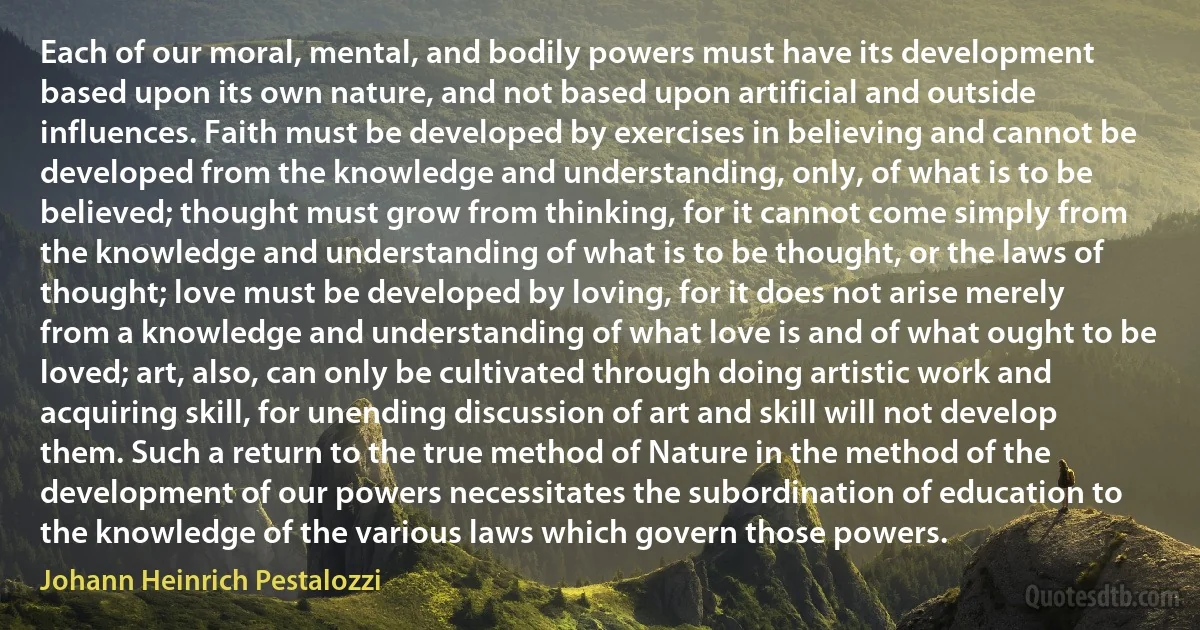
Each of our moral, mental, and bodily powers must have its development based upon its own nature, and not based upon artificial and outside influences. Faith must be developed by exercises in believing and cannot be developed from the knowledge and understanding, only, of what is to be believed; thought must grow from thinking, for it cannot come simply from the knowledge and understanding of what is to be thought, or the laws of thought; love must be developed by loving, for it does not arise merely from a knowledge and understanding of what love is and of what ought to be loved; art, also, can only be cultivated through doing artistic work and acquiring skill, for unending discussion of art and skill will not develop them. Such a return to the true method of Nature in the method of the development of our powers necessitates the subordination of education to the knowledge of the various laws which govern those powers.
Johann Heinrich PestalozziRelated topics
acquiring art development education faith govern knowledge love loving nature ought outside return skill subordination thought thinking understanding work lawsRelated quotes
Today, after eighteen years of defeat, the book of your domination is again opened, and your first act awakens every unhappy memory, and threatens to destroy the confidence which your professions of patriotism inspired. You turned down a leaf of the history that recorded your last act of power in 1861, and you have now signalized your return to power by beginning a second chapter at the same page, not this time by a heroic act that declares war on the battlefield, but you say, if all the legislative powers of the government do not consent to let you tear certain laws out of the statute-book, you will not shoot our government to death as you tried to do in the first chapter, but you declare that if we do not consent against our will, if you cannot coerce an independent branch of this government, against its will, to allow you to tear from the statute-books some laws put there by "there by the will of the people, you will starve the government to death.

James A. Garfield
There are two ways of considering society. According to some, the development of human associations is not subject to providential, unchangeable laws. Rather, these associations, having originally been organized in a purely artificial manner by primeval legislators, can later be modified or remade by other legislators, in step with the progress of social science. In this system the government plays a preeminent role, because it is upon it, the custodian of the principle of authority, that the daily task of modifying and remaking society devolves.According to others, on the contrary, society is a purely natural fact. Like the earth on which it stands, society moves in accordance with general, preexisting laws. In this system, there is no such thing, strictly speaking, as social science; there is only economic science, which studies the natural organism of society and shows how this organism functions.

Gustave de Molinari
At first we got along very well. Esipova even boasted outside the class that she had pupils who wrote sonatas (I completed Sonata, Op. 1, and played it to Esipova, who took it home and inserted pedaling). But before long trouble began. Esipova's method of teaching was to try to fit everyone into a standard pattern. True, it was a very elaborate pattern, and if the pupil's temperament coincided with her own, the results were admirable. But if the pupil happened to be of an independent cast of mind Esipova would do her best to suppress his individuality instead of helping to develop it. Moreover, I had great difficulty in ridding myself of careless playing, and the Mozart, Schubert and Chopin which she insisted on were somehow not in my line. At that period I was too preoccupied with the search for a new harmonic idiom to understand how anyone could care for the simple harmonies of Mozart.

Anna Yesipova
Since the word "knowledge" occurs in my general title... I am going to be talking about epistemology, although I prefer to use the eighteenth-century, indeed, medieval phrase, "natural philosophy."... that enterprise of the human mind which attempts to trace lawfulness to nature, dead and living, but which is not directed to specific inquiries into how this or that law works. Philosophy in the sense in which I practice it, natural philosophy, is concerned with lawfulness rather than with laws and the general nature of laws rather than with the specific structure of this or that law. Natural philosophy was one of the three topics (moral philosophy and metaphysical philosophy were the others) to which one graduated in medieval universities after having studied the seven liberal arts.
I believe that we need to review the whole of our natural philosophy in the light of scientific knowledge that has arisen in the last fifty years.

Jacob Bronowski
Now, without directly altering the existing condition of things, it is possible to work upon the human mind and character, and give them a direction no more correspondent with that condition; and this it is precisely which he who is wise will endeavour to do. Only in this way is it possible to reproduce the new system in reality, just as it has been conceived in idea; and in every other method (setting aside the evils which arise from disturbing the natural order of human development) it is changed, modified, disfigured by the remaining influence of preceding systems, in the actual state of circumstances as well as in the minds of men. But if this obstacle be removed,-if the new condition of things which is resolved upon can succeed in working out its full influence, unimpeded by what was previously existing and by the circumstances of the present on which this has acted,-then must nothing further be allowed to stand in the way of the contemplated reform.

Wilhelm von Humboldt
